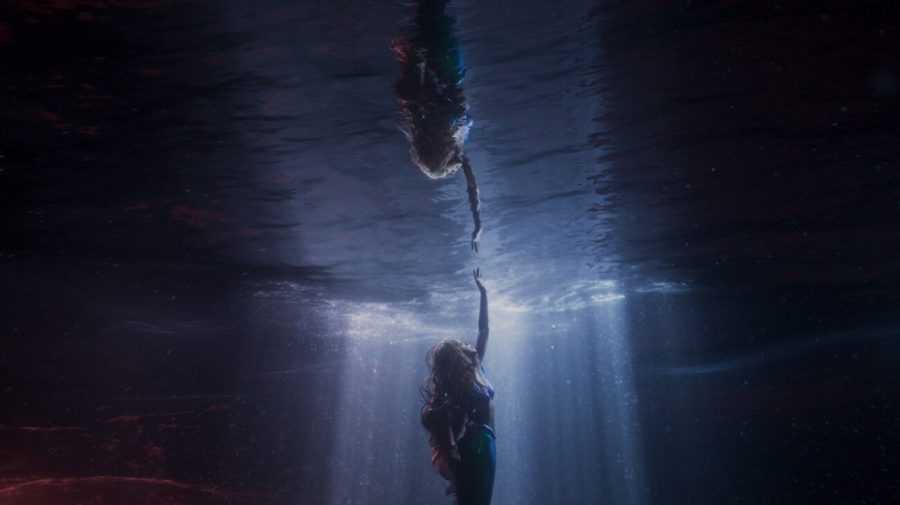‘The Little Mermaid’: Not Just Another Disney Remake
Halle Bailey as Ariel in Disney’s live-action The Little Mermaid. (Photo courtesy of Disney Enterprises)
June 3, 2023
On May 26, Disney released the latest live-action remake of an animated classic to add to their ever-growing collection: “The Little Mermaid.” The more of these remakes that Disney releases, the more fans grow tired of the recycled content. Many claim that the films are just preying on audiences’ nostalgia in an attempt to distract from a serious lack of original ideas. As much as “The Little Mermaid” may have taken from its counterpart story-wise, it brought new and welcome changes to other aspects of the characters, the songs and even the overall lesson.
Homage or Remake?
One of the issues that has been the most consistent in Disney’s litany of live-action remakes has been their refusal to change the stories themselves, or, in certain cases, even the scripts or the cinematography. For example, in the CGI remake of “The Lion King,” the entire movie was essentially a shot-for-shot remake of the original. It was boring and a clear money grab from Disney, who knew that people would spend movie theater prices to watch it no matter what. The same cannot be said for “The Little Mermaid.” The underwater scenes were beautiful and exciting to watch and the day that Ariel and Eric spend together touring the kingdom before “Kiss the Girl” is much more fleshed out, giving a much-needed personality to Eric’s island.
The most important changes that were made in this movie were actually in the song lyrics. It’s easy to spot in both “Poor Unfortunate Souls” and “Kiss the Girl,” but it changes the context of both quite drastically. When Ursula sings “this one longing to be thinner/that one wants to get the girl …” she gestures to Flotsam and Jetsam instead of conjuring up images of a plus-sized woman and man who are transformed into conventionally attractive people. They also cut out the verse about underestimating the importance of “body language” entirely. The change to “Kiss the Girl” was my favorite, because instead of saying “Possible she wants you too/There is one way to ask her/It don’t take a word, not a single word/Go on and kiss the girl,” Sebastian instead sings, “Possible she want you too/Use your words, boy, and ask her/If the time is right and the time is tonight/Go on and kiss the girl.” It honestly sent chills down my spine to know that Disney prioritized making a change like that.
Character Design and Development
When trailers were first released for “The Little Mermaid” many fans were upset over the way in which filmmakers changed up the designs of their favorite characters. Flounder and Sebastian were portrayed as a realistic angelfish and tropical ghost crab, and Scuttle received a pretty jarring transformation from a seagull into a gannet. However, when seen in the movie as a whole, it became clear that if they had retained their original cartoon-y and anthropomorphized designs, they would have been completely out of place in the rest of the film and its realistic ocean landscapes.
Another character design that people are having a hard time overlooking is Ursula. This one feels slightly more justified, however, as Melissa McCarthy’s fantastic performance was lessened by her very underwhelming appearance. The original Ursula was largely inspired by a drag queen named Divine who was well-known for her outlandish makeup and memorable stage presence.
While McCarthy acknowledged how much Divine’s inspiration meant to her in an interview with Yahoo, Ursula’s makeup in the film was … well … boring. Drag makeup is meant to change the shape of one’s face drastically with contour and dramatize one’s features with over-lined lips and blocked-out brows, but Ursula looked like she had watched a tutorial on how to Disney-bound herself with an everyday glam look.
And, of course, there’s the elephant in the room. Halle Bailey’s role as Ariel has raised much controversy ever since it was announced. People were either upset that Disney was changing the mermaid’s race because she was white in the original, and therefore clearly needed to be so in the remake, or because they saw it as some half-hearted attempt at forcing representation into the film. The latter is understandable to some degree, especially with Disney’s history of randomly throwing in representation just for the sake of inclusivity, but to be honest these criticisms should have all disappeared the second the movie was released. Bailey did a phenomenal job as Ariel, both in her acting as well as her singing. Her race should not have any effect on peoples’ judgment regarding her sheer talent.
Inclusivity Ekes In
If casting Bailey as Ariel was a half-hearted attempt at inclusivity and representation, then the rest of the casting choices must have been exactly the same. Watching the original “The Little Mermaid” serves as a reminder as to just how white-washed everything was from beginning to end, and this movie is the exact opposite. King Triton’s seven daughters supposedly represent the seven seas. In 1989, they were all skinny white mermaids with different colored hair named Attina, Alana, Adella, Aquata, Arista and Andrina. In the remake, however, Triton’s daughters (Perla, Indira, Mala, Tamika, Karina and Caspia) are played by a diverse group of women who are representative of the diversity of the seas themselves. Prince Eric’s kingdom is ruled by a Black woman and the population that makes up the island is filled with a number of different ethnicities and races.
My favorite subtle moment of inclusivity is when Ariel is first asking Scuttle about the dinglehopper’s purpose. In the original film, Scuttle says “humans use these little babies to straighten their hair out.” However, in the remake, she says “humans use these babies to style their hair.” Such a tiny detail that I didn’t even notice until I was rewatching the original, but the meaning changes so drastically.
Overall, it’s understandable to be hesitant about yet another live-action remake of a Disney classic. However, “The Little Mermaid” is absolutely worth the watch if only to hear Bailey, Jonah Hauer-King and Daveed Diggs singing your favorite Disney tunes — and a few originals — for two hours.












